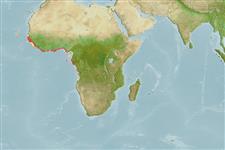>
Eupercaria/misc (Various families in series Eupercaria) >
Haemulidae (Grunts) > Plectorhinchinae
Etymology: Plectorhinchus: Greek, plektos = plaited + Greek, rhyngchos = snout (Ref. 45335).
More on author: Boulenger.
Environment: milieu / climate zone / depth range / distribution range
Ecologia
marinhas; estuarina bentopelágico; intervalo de profundidade 10 - ? m (Ref. 2683). Tropical; 15°N - 13°S
Eastern Atlantic: west African coast, from Senegal to Democratic Republic of Congo (Ref. 81655) and Angola (Ref. 7376, 57395).
Tamanho / Peso / Idade
Maturity: Lm ? range ? - ? cm
Max length : 45.0 cm TL macho/indeterminado; (Ref. 5476); common length : 30.0 cm TL macho/indeterminado; (Ref. 5476)
Espinhos dorsais (total): 14; Raios dorsais moles (total): 16; Espinhos anais 3; Raios anais moles: 7. Diagnosis: body oblong, rather deep; dorsal profile strongly convex at level of dorsal-fin origin (Ref. 57395). Snout at least as long as eye diameter (Ref. 57395), eyes large (Ref. 81655). Mouth oblique (Ref. 57395), small (Ref. 81655) with very thick (Ref. 57395) and fleshy (Ref. 81655) lips. Chin with 6 pores (erroneously reported as 4 since original species description; Ref. 81655), but without median pit (Ref. 57395). Dorsal fin long; second anal fin spine longest and stoutest; ctenoid scales covering body and head (except snout) and interradial membranes of soft parts of dorsal and anal fins (Ref. 57395). Caudal fin rounded (Ref. 57395, 81655).
Coloration: uniformly brown, more or less dark; young individuals often with lighter spots on flanks (Ref. 57395, 81655). In small specimens (< 60 mm SL), distal part of soft dorsal fin, posterior 3/4 of caudal fin and distal part of anal fin transparent (Ref. 81655).
Relatively rare species (Ref. 57395). Inhabits coastal waters (Ref. 3660, 57395), estuaries and coastal lagoons (Ref. 2683). Juveniles and sub-adults often in estuaries and lagoons (Ref. 2135, 57395, 81655), in freshwater (Ref. 2135), where sexual maturation begins (Ref. 57395).
Life cycle and mating behavior
Maturidade | Reprodução | Desova | Ovos | Fecundidade | Larvas
Oviparous, distinct pairing during breeding (Ref. 205).
Roux, C., 1990. Haemulidae. p. 783-788. In J.C. Quero, J.C. Hureau, C. Karrer, A. Post and L. Saldanha (eds.) Check-list of the fishes of the eastern tropical Atlantic (CLOFETA). JNICT, Lisbon; SEI, Paris; and UNESCO, Paris. Vol. 2. (Ref. 6946)
Categoria na Lista Vermelha da IUCN (Ref. 130435)
Ameaça para o homem
Harmless
Utilização humana
Pescarias: espécies comerciais
Mais informação
ReferênciasAquaculturaPerfil para aquaculturaEstirpesGenéticaElectrophoresesHereditariedadeDoençasProcessamentoNutrientsMass conversion
ColaboradoresFotografiasStamps, Coins Misc.SonsCiguateraVelocidadeTipo de nataçãoÁrea branquialOutras referênciasCérebrosVisão
Ferramentas
Relatórios especiais
Descarregue XML
Fontes da internet
Estimates based on models
Preferred temperature (Ref.
123201): 22.6 - 27.9, mean 26.3 °C (based on 40 cells).
Phylogenetic diversity index (Ref.
82804): PD
50 = 0.5000 [Uniqueness, from 0.5 = low to 2.0 = high].
Bayesian length-weight: a=0.01950 (0.00846 - 0.04494), b=2.95 (2.75 - 3.15), in cm total length, based on LWR estimates for this (Sub)family-body shape (Ref.
93245).
Nível Trófico (Ref.
69278): 3.7 ±0.6 se; based on size and trophs of closest relatives
Resiliência (Ref.
120179): Médio, tempo mínimo de duplicação da população 1,4 - 4,4 anos (Preliminary K or Fecundity.).
Fishing Vulnerability (Ref.
59153): Low to moderate vulnerability (35 of 100).
Climate Vulnerability (Ref.
125649): Very high vulnerability (89 of 100).
Nutrients (Ref.
124155): Calcium = 72.6 [20.8, 161.1] mg/100g; Iron = 0.726 [0.384, 1.531] mg/100g; Protein = 17.8 [15.9, 19.8] %; Omega3 = 0.176 [0.077, 0.347] g/100g; Selenium = 56.4 [26.6, 114.0] μg/100g; VitaminA = 20.4 [7.2, 56.7] μg/100g; Zinc = 1.19 [0.77, 1.83] mg/100g (wet weight);
